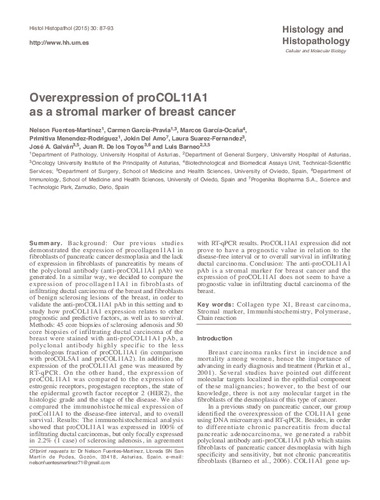Overexpression of proCOL11A1 as a stromal marker of breast cancer
Editor/Coord./Trad.:
Palabra(s) clave:
Cáncer
Mama
Fecha de publicación:
Citación:
Descripción física:
Resumen:
Background: Our previous studies demonstrated the expression of procollagen11A1 in fibroblasts of pancreatic cancer desmoplasia and the lack of expression in fibroblasts of pancreatitis by means of the polyclonal antibody (anti-proCOL11A1 pAb) we generated. In a similar way, we decided to compare the expression of procollagen11A1 in fibroblasts of infiltrating ductal carcinoma of the breast and fibroblasts of benign sclerosing lesions of the breast, in order to validate the anti-proCOL11A1 pAb in this setting and to study how proCOL11A1 expression relates to other prognostic and predictive factors, as well as to survival. Methods: 45 core biopsies of sclerosing adenosis and 50 core biopsies of infiltrating ductal carcinoma of the breast were stained with anti-proCOL11A1 pAb, a polyclonal antibody highly specific to the less homologous fraction of proCOL11A1 (in comparison with proCOL5A1 and proCOL11A2). In addition, the expression of the proCOL11A1 gene was measured by RT-qPCR. On the other hand, the expression of proCOL11A1 was compared to the expression of estrogenic receptors, progestagen receptors, the state of the epidermal growth factor receptor 2 (HER2), the histologic grade and the stage of the disease. We also compared the immunohistochemical expression of proCol11A1 to the disease-free interval, and to overall survival. Results: The immunohistochemical analysis showed that proCOL11A1 was expressed in 100% of infiltrating ductal carcinomas, but only focally expressed in 2.2% (1 case) of sclerosing adenosis, in agreement with RT-qPCR results. ProCOL11A1 expression did not prove to have a prognostic value in relation to the disease-free interval or to overall survival in infiltrating ductal carcinoma. Conclusion: The anti-proCOL11A1 pAb is a stromal marker for breast cancer and the expression of proCOL11A1 does not seem to have a prognostic value in infiltrating ductal carcinoma of the breast.
Background: Our previous studies demonstrated the expression of procollagen11A1 in fibroblasts of pancreatic cancer desmoplasia and the lack of expression in fibroblasts of pancreatitis by means of the polyclonal antibody (anti-proCOL11A1 pAb) we generated. In a similar way, we decided to compare the expression of procollagen11A1 in fibroblasts of infiltrating ductal carcinoma of the breast and fibroblasts of benign sclerosing lesions of the breast, in order to validate the anti-proCOL11A1 pAb in this setting and to study how proCOL11A1 expression relates to other prognostic and predictive factors, as well as to survival. Methods: 45 core biopsies of sclerosing adenosis and 50 core biopsies of infiltrating ductal carcinoma of the breast were stained with anti-proCOL11A1 pAb, a polyclonal antibody highly specific to the less homologous fraction of proCOL11A1 (in comparison with proCOL5A1 and proCOL11A2). In addition, the expression of the proCOL11A1 gene was measured by RT-qPCR. On the other hand, the expression of proCOL11A1 was compared to the expression of estrogenic receptors, progestagen receptors, the state of the epidermal growth factor receptor 2 (HER2), the histologic grade and the stage of the disease. We also compared the immunohistochemical expression of proCol11A1 to the disease-free interval, and to overall survival. Results: The immunohistochemical analysis showed that proCOL11A1 was expressed in 100% of infiltrating ductal carcinomas, but only focally expressed in 2.2% (1 case) of sclerosing adenosis, in agreement with RT-qPCR results. ProCOL11A1 expression did not prove to have a prognostic value in relation to the disease-free interval or to overall survival in infiltrating ductal carcinoma. Conclusion: The anti-proCOL11A1 pAb is a stromal marker for breast cancer and the expression of proCOL11A1 does not seem to have a prognostic value in infiltrating ductal carcinoma of the breast.
Patrocinado por:
This research has been cofinanced by FEDER Funds from the European Union; Proyecto INNPACTO-ONCOPAN IPT-010000-2010-31; by Proyecto FISS-09-PS09/01911, Ministerio de Ciencia e Innovación, Spain; by Proyecto FC-11-PC10-23, FICYT, Eje 1 del Programa Marco Operativo FEDER del Principado de Asturias 2007-2013, Spain; and by Progenika Biopharma, S.A. and Oncomatrix, S.L. Derio, Spain. The proCOL11A1 mAb has been patented by Oncomatrix,S.L. (PCT/ES2012/070616; WO 2013/021088 A2).
Colecciones
- Artículos [37541]
- Cirugía y Especialidades Médico Quirúrgicas [317]
- Investigaciones y Documentos OpenAIRE [8416]
Ficheros en el ítem





